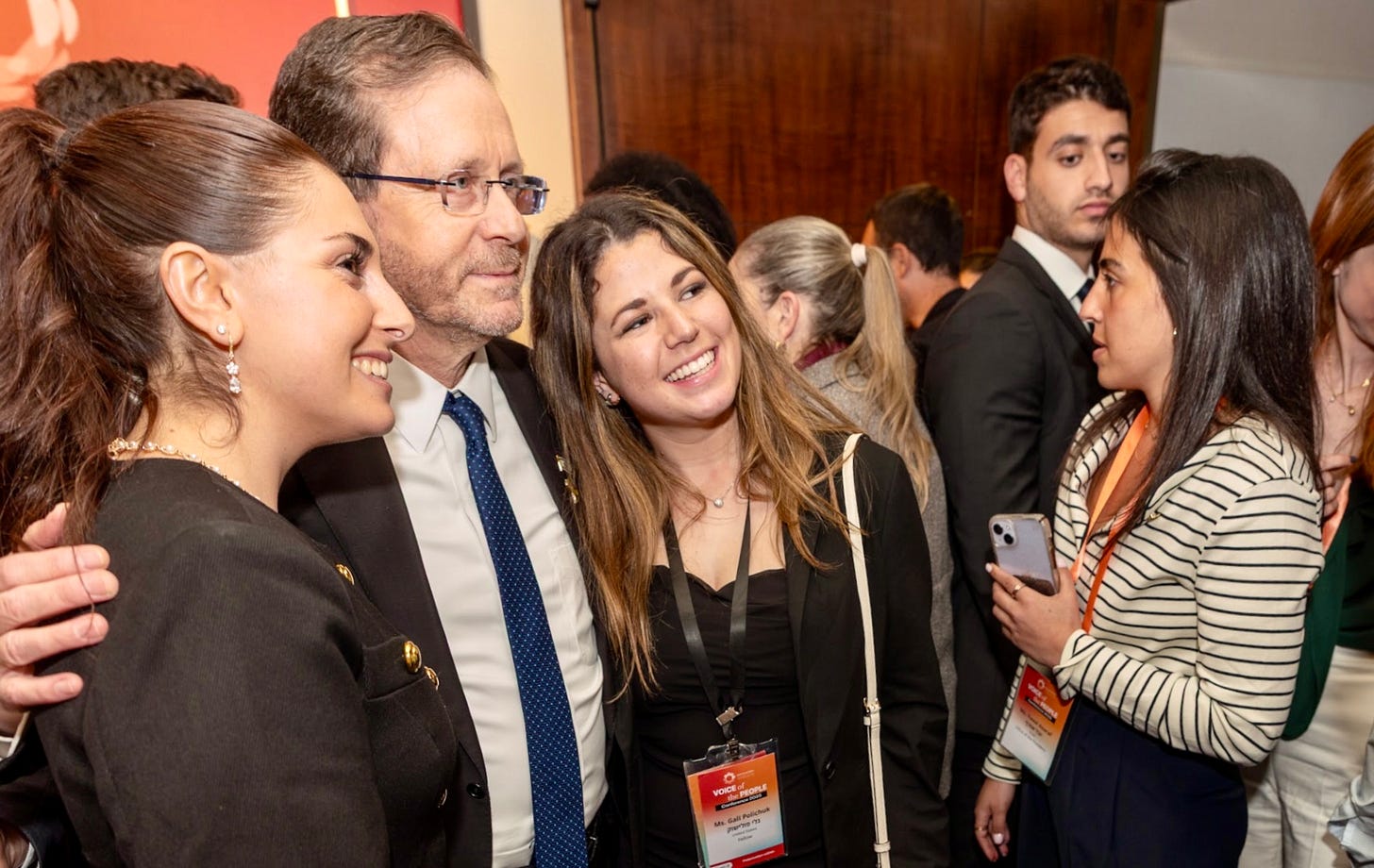I feel most at home in Israel and America, and also feel deeply connected to the other Jewish communities from which my family hails: Egypt, Mexico, the Caucasus, and France. During this past week's The Voice of the People conference initiated by Israeli President Isaac Herzog, I relished in this multicultural pool surrounded by Jews from communities around the world on a social, spiritual, and emotional level. Languages from every corner of the globe permeated the air and boundless perspectives filled my mind and challenged my convictions.

The 150 council members from around the world were joined by a variety of prominent Jewish leaders and public speakers over five days in Haifa, Israel. This diverse group of Jewish leaders from Israel, America, Canada, Colombia, Argentina, Mexico, Brazil, France, Peru, Germany, Belgium, Denmark, the UK, Australia, Ethiopia, Hong Kong, and beyond brought a wide range of perspectives on the Jewish world's most pressing issues. Working-groups clustered by theme revolved around antisemitism, Israel-World Jewry relations, polarization from within, interfaith relations, and more.
Over the course of a week packed with passionate debates on topics ranging from Jewish law and tradition to contemporary Israeli political challenges, we found ourselves immersed in the historical disputes of our ancestors. This compelled us to confront what my group, Israel-World Jewry Relations, dubbed an "eternal machloket," or eternal disagreement. Through these disagreements, our shared love for Israel and our curiosity about how we each fit into the mosaic of our spiritual or physical home (or both) helped us navigate our differences and press forward with a solution-oriented mindset. After all, this is the spirit of family: one that can disagree freely but always finds its way back home. This is and must remain the modus vivendi of the people of Israel.

In addition to our productive and vivid sessions, we visited sites that evoked an intertwined sorrow and unity. We explored Kibbutz Ruchama and paid tribute to the victims of the Nova Festival in Re’im. We heard from two brave women of Kibbutz Erez and Kfar Azza, and listened to the stories of bereaved families and heroes. Among them were the parents of Matan Lior z’’l, who was murdered at the Nova Festival while relentlessly trying to save others. They shared that, to this day, people still knock on their door to thank their son for saving their lives or the lives of their children. Surely, listening to these stories and bonding over the shared loss of people who were family—or felt like family—fostered a deep sense of connection. But these moments of bonding also provided me with insight into how individuals from different cultures manage trauma and how interactions between them play a role in addressing broader Jewish matters.

My most memorable moments surfaced when council members were given the freedom to roam. On the first day, I befriended a fellow council member from Mexico. She told me about the divisions between the inter-Sephardic and Sephardi-Ashkenazi communities within the Mexican Jewish population, and how these divisions influence gentile perceptions of Jews. One night, I took a long walk through the steep hills of Haifa with a fellow council member—a German writer who, like me, studied philosophy. She shared her deep knowledge of the history of German Holocaust memory culture, the increasing conservative shift within the German Jewish community, and the impact of October 7th on German-Jewish and German-Israel relations. At the concluding gala dinner, I had a conversation with a council member from Colombia who was working to counter how Tikkun Olam has been weaponized by anti-Israel forces through sharing bilingual videos on social media that educated others about Israel and Jewish culture.

Engaging with Jewish leaders inside and outside the Israeli-American hub, who are not typically found at Jewish and Israel-related conferences I attend, helped me understand how the two largest Jewish communities—America and Israel—may have fallen behind, or, as author of Israel Alone, Bernard Henri-Lévy, described the West, have been "asleep" to the many challenges the Jewish world faces. My fellow council members from Germany and Mexico shared with me the realizations their communities had embraced and been trying to address long before this pivotal post-October 7th moment.
But this rejuvenated council, standing as a microcosm of the Jewish world, instilled me with a ray of hope. Looking beyond the Israel-US divide could be the missing puzzle piece we need, along with internalizing the humbling idea that some pieces will always be missing, and others can be challenged and changed.




Keep the spirit of Am Israel Chai with Americas resources, support, and connections ❣️🇮🇱🇺🇸
So amazing!!!